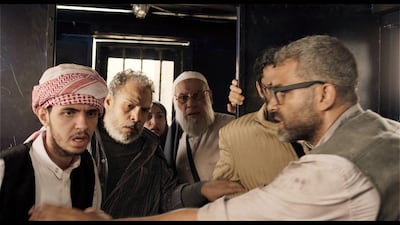An Egyptian political thriller, Clash, had its international premiere at the Cannes Film Festival.
Screened as part of the festival's director-focused programme – Un Certain Regard – on Thursday, Clash takes place in the days following the ousting of president Mohammed Morsi in June 2013. Protesters are on the streets and the army is trying to assert control.
The state clamps down and protesters of all political hues are arrested and thrown into the back of a police van.
Beautifully shot and with the action mostly taking place within the confines of the police van, Clash explores the societal and political complications plaguing the Egyptian nation.
“I was trying to find something that expressed the revolution – I participated in it,” says the film’s 38-year-old director, Mohamed Diab. “When my brother came up with the idea, I thought it was brilliant.”
Diab says Clash is natural evolution from his previous feature film, 2010's Cairo 678.
"I always like challenges," he says. "Cairo 678 was full of women, and now this one has a lot of testosterone and power – and I like that. Definitely, there were huge challenges to make this film. To add to the usual technical challenges, we didn't have money and it's impossible to shoot on Egyptian streets. People will mistake you as a Muslim Brotherhood protester and they would shoot you, or they would mistake you for the police and they might shoot you. It was very scary. "
The threatening atmosphere eventually resulted in the cast and crew experiencing violent attacks. One of the producers was kidnapped – and found with a skull fracture.
“He was my line producer, Ahmed Farghelly,” says Diab. “I said to him: ‘I’m sorry’, and he replied: ‘I would do it again in a heartbeat.’ This is how much they believed in the project.
“The two actresses got hit by rocks in their faces. I had to convince Nelly Karim, the biggest star in the Arab world, I told her to throw a stone in my face and she did. This is part of directing, if you want to put your actors through something, you have to be willing to do it yourself.”
There were also challenges on the technical side.
“How to shoot 25 people in that crowded police van? It was just one car, that is the real measurements,” Diab says. “There are no tricks. I couldn’t get inside the car. It was only my DP [director of photography], who bruised a lot of the actors with his camera.”
The tight setting serves a purpose, Diab says. It forces his characters to take a closer look at their so-called enemies and friends.
“The first step of every civil war is dehumanising people,” he says. “The first step of solving that is humanising people. This is what the film is trying to do.
“I think one of the main things that the West can take from the film is the origin of violence. This film is set before the rise of violence. You see the journey of those guys, who say peaceful protest at the beginning – but with all that is going on, two people are, by the end, talking about going to Syria.”
Diab also wanted to avoid writing a script that favoured a particular political view point. He says this objectivity came from his experience of writing and directing his 2007 film El Gezira.
Hailed as "the Egyptian Godfather", the drama was the country's official nomination for the Academy Awards, and follows the story of Mansour, the ruler of the island of Gezira.
“When I started writing this story, researching and going to where he lived, I questioned myself: could I have been this person if I was in his position?” he says. “Then that became the premise of the film. That changed me as a human being.
“Yes, I have a very strong point of view about the revolution. But this film was not about this. What the revolution represented was unity and freedom of everyone, and human rights. These are the main values of revolution, and I think the film is about that. Yes, you are entitled to have separate opinion, as long as you let me coexist with you. That’s why I made everyone have a point of view without, as much as possible, putting mine.”
In its refusal to take sides, while cranking up the action, Clash is reminiscent of the 1966 historical drama The Battle of Algiers, while the claustrophobic setting evokes taut dramas such as 2009's Lebanon and 1981's submarine tale Das Boot – all classic films that Clash deserves to be ranked alongside.
Diab believes Egypt’s current strife is moving the country in the wrong direction.
“There is no country that has gone forward with this kind of division,” he says. “Division is not only in the streets but in every family. I have this in my family. If we start talking about politics at dinner, we would start a fight that would end in someone leaving the house.”
artslife@thenational.ae


